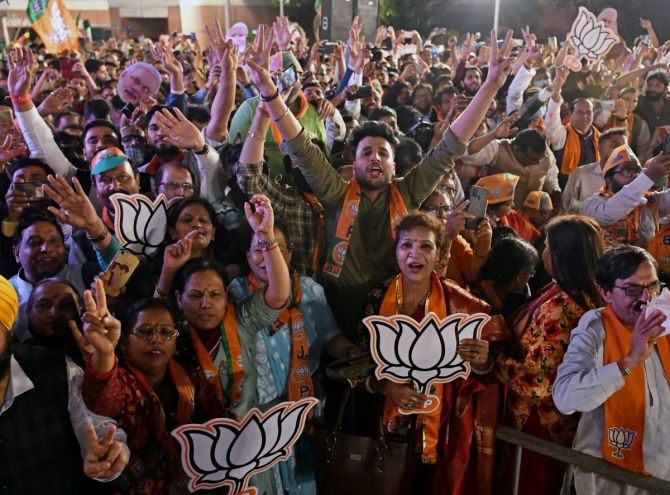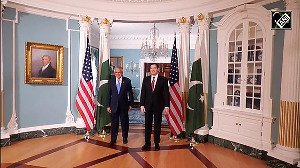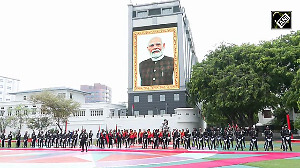Successive elections have demonstrated that the BJP campaign switches towards polarisation when it is faced with palpable discontent among the electorate, notes Utkarsh Mishra.

When Narendra Modi threw his hat in the race for prime ministership ahead of the 2014 Lok Sabha elections, he made sure that his campaign never overtly highlighted his popular image of a Hindutva icon.
Instead, a carefully constructed image of a 'vikas purush' was projected, selling his 'Gujarat model' of development against a dispensation that was tattered by corruption and scams.
Three years later, in 2017, assembly elections were held in Uttar Pradesh, a state where the Bharatiya Janata Party was out of power since 2002 and where they expected to do well given their performance in the Lok Sabha polls three years earlier.
However, these elections were held under the shadow of demonetisation.
Hence, the BJP campaign shifted a bit towards the Hindutva appeal, and the 'shamshan-kabaristan' rhetoric made it to election speeches.
The mandate the BJP won in 2017 was way more than their own expectations. They knew very well that a vote for Hindutva was a big reason for that victory and that reflected in their choice of chief minister: A saffron-clad monk known for his anti-Muslim rhetoric who had formed a militia of sword-wielding Hindu youngsters.
When I spoke to an office-bearer of the Akhil Bharatiya Vidyarthi Parishad, the student wing of the Rashtriya Swayamsevak Sangh, during the 2017 campaign, he said people were rooting for the BJP because 'anti-national forces have consolidated themselves against Modi'.
That has been the basis of the BJP's rhetoric in successive elections ever since: 'Anyone against us is anti-Hindu, anti-national'. It makes its way every day to lakhs of households through the cacophony on television news called 'debates'. The topics of these debates are carefully constructed and panellists chosen in a manner to make the viewers a little more communal than they were a day earlier.
While the influence of WhatsApp and social media on voters' choice is beyond dispute, a very large number of people -- especially the urban middle class -- still form their opinions based on television 'news'.
And it serves the Hindutva agenda well. It's like an everyday election campaign for them.
The latest assembly elections in Uttar Pradesh were conducted less than a year after the world saw corpses of COVID-19 victims floating in the Ganga, and less than six months after a mighty government bowed down to farmers' protests and rolled back the farm laws.
The Yogi Adityanath government was also on the backfoot over the incidents at Hathras and Lakhimpur Kheri, both of which threatened to cost it voters among the Valmiki and Jat communities.
The BJP not only won Hathras and Lakhimpur Kheri; it only lost a few seats in Western UP that it won last time to the Samajwadi Party. Its non-Yadav OBC votes and non-Jatav Dalit votes were more or less intact.
Stalwart OBC leaders Swami Prasad Maurya and Dharam Singh Saini, who had switched over to the SP just before the polls and on whom Akhilesh Yadav was pinning his hopes to win the OBC votes, lost to relative newbies fielded by the BJP.
This clearly says that the M-Y factor Akhilesh relied on was not enough to counter Yogi Adityanath's 80:20 equation.
Yes, the free ration given to the poor and the perception of good law and order situation worked in the BJP's favour. But their campaign for this election was laden with polarising statements like never before. Even while talking about free ration and law and order, their leaders never shied away from passing remarks construed as offensive to the Muslim community.
While accepting that previous governments too distributed free ration, Adityanath said that it went only to 'those who said abba jaan'. And while talking about restraining the mafia in the state, he only mentioned two names: Mukhtar Ansari and Ateeq Ahmed.
One of the campaign slogans that went around was 'Jo Ram ko laye hain, hum unko layenge. Kashi aur Mathura ko ab hum mukt karayenge (we will bring those to power who built the Ram temple, and we will free Kashi and Mathura too).'
Adityanath's deputy Keshav Prasad Maurya also spoke about building a temple in Mathura on the lines of Ayodhya. His Panchayati Raj minister Bhupendra Singh Chaudhary said Asaduddin Owaisi would wear a 'janeu' (the sacred thread worn by upper caste Hindus) if Yogi is re-elected and Domariyaganj MLA Raghvendra Pratap Singh went so far as to say that whoever doesn't vote for the BJP 'has Muslim blood in their veins'.
Successive elections have demonstrated that the BJP campaign switches towards polarisation when it is faced with palpable discontent among the electorate. And it benefits the party most of the time.
While it is true that the Opposition's media and information machinery is not as strong as the BJP and the latter often succeeds in setting the agenda and forming a perception, it cannot be denied that the Opposition parties -- the SP, the Rashtriya Lok Dal and the Congress -- did not work hard enough to tap into the public anger this time.
That they failed despite their best efforts can be explained in one quote of Mark Twain: 'Give a man a reputation as an early riser, and he can sleep till noon'.
Until this perception of 'all those who are against the BJP are anti-national and anti-Hindu' stays with the people, fuelled and renewed by television 'news' media every day, it is very hard for the Opposition parties to trounce the BJP, at least in states like UP, regardless of all the aggravating factors against BJP governments.











